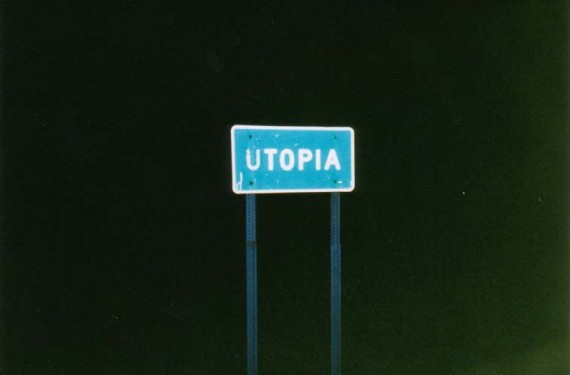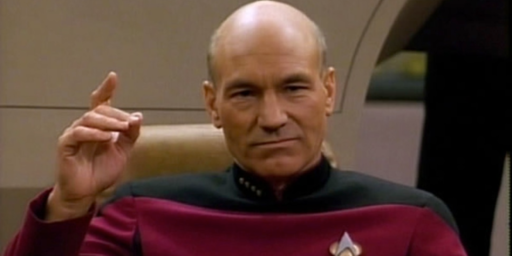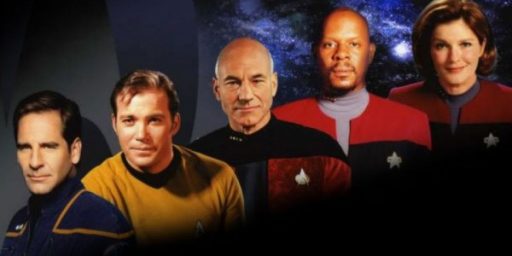Utopia Is A Relative Concept
What we think the ideal society looks like depends a lot on what kind of society we live in.
Shannon Love reminds us that utopia is a relative concept:
Star Trek is often used as a starting point for musing about this or that utopia because everything in Star Trek seems so wonderful. Star Trek is Gene Roddenberry‘s vision of New Frontier democratic socialism evolved to a utopia so perfect that individuals have to head out into the wilds of deep space just to find some adventure. Watching Star Trek, one naturally begins to wonder what it would be like to live in a world so advanced that all of the problems we deal with today have been resolved or minimized to insignificance.
Well, we don’t actually have to imagine what it would be like to live in a Star Trek-like, radically egalitarian, technologically advanced, “post-scarcity” society because we live in a Star Trek-like utopia right now, right here, in contemporary America.
How can I say that? Simple, Star Trek the Next Generation takes place 353 years in the future from 2364 to 2370. If we were to think of ourselves as living in a futuristic science-fiction society we would likewise look back 353 years in the past to 1658.
Image what modern America would look like to the people of any of the world’s major cultures back in 1658! Any novel, movie, TV or comic book set in day-to-day middle-class America would read like astounding science fiction to anyone from 1658. Our society looks even more utopian in comparison to 1658 than Star Trek world 2370 looks to us today.
I’m not just talking about all the amazing and frightening technology like nuclear power/weapons, spacecraft, cars, cell phones, computers, the Internet, etc. I’m also talking about issues of want, individual dignity and social/political equality.
Just to start, by the standards of anywhere 1658 ,contemporary America is a land completely devoid of material poverty. No one in 1658 would consider anyone in America, even a street person, to be even marginally materially poor. Poor people today in American have a material standard of living that surpasses that of even the wealthiest individual in 1658.
For example, just turning on a faucet and getting safe, clean drinking water would look as amazing to a 1658 person as a Star Trek replicator looks to us today.
A poor American has functionally unlimited access to clean drinking water, something not even the emperors of 1658 had. A 1658 person would be gobsmacked that we take perfectly clean and safe drinking water so much for granted that we don’t think there is anything even remotely odd about using a few gallons of it to shit and piss in every single time we go to the bathroom!
In 1658, one in four children died before the age of five. For poor Americans today, more children die from accident than disease. In 1658, waves and waves of disease cut through the population regularly, killing young and old alike in vast numbers. Plagues of all kinds emptied cities and wiped out armies. In modern America, owing to vaccines, antibiotics and sanitation even the poorest person is protected from history’s greatest killers. We have so forgotten the terrible diseases of the past that many of today’s idiots question if vaccinations and antibiotics are even necessary any longer!
In 1658, even middle-class people spent 80% of their income on food and the poor spent 95%. Today, our “poor” spend at most 25%. Moreover, they routinely eat 1658 luxury foods like beef, jello and marshmallows. Spices common today like black pepper cost the equivalent of hundreds of 2011 dollars an ounce in 1658. Sugar in 1658 cost roughly five dollars a teaspoon. Tea and coffee were exotic drinks of the fashionable wealthy, selling for the equivalent of $20 or more a cup.
Even more amazing, poor people today eat different foods for every meal every day! In 1658, the vast majority of humanity ate the same boiled grain/rice for their one or two meals a day, every day. There was no seasoning and salt was rare. Any meat at all was a weekly or monthly luxury. You had to be a 1658 upper-middle class to eat bread with every meal. If you bemoaned to anyone in 1658 that 2011 America was a flawed society in part because obesity was a major health concern for its poor, they would have looked at you like you were insane. Well, the wealthiest of 1658 would think you insane, the actual poor of 1658 would beat you to death in moral outrage.
Indeed, they likely would. Not to mention the fact that the idea of being able to talk to anyone in the world at any time with a device that fits in the palm of your hand would seem like witchcraft to them and might just get you burnt at the stake. And that was a mere 353 years ago. Unless humanity enters a new Dark Age or the Earth experiences some sort of calamity that sets civilization back several centuries, if not more, the world of 2364 is likely to be just as far beyond our current ability to conceive. It may not be the Star Trek future, that’s a fictional show that employs fictional technologies and has a fictional history that doesn’t match our own, but it’s likely to be pretty darn amazing anyway. For all we know, the 2364’ers will look back at Star Trek and other visions of the future that we have today and laugh at our naivete and lack of imagination. At the same time, though, they’ll probably be having their own ideas of what 2717 will be like that will turn out to be just as wrong.
By its very definition, utopia is an unattainable ideal state of existence. Part of the reason for that, I think, is that our idea of what a “utopia” is changes as we become more technologically advanced. Usually, our view of what the future will be like is constrained by the world we live in at the time. Consider, for example, this video from 1969 that predicted what the future of home computing would be like.:
Even in this home of the future in 1969, the computers were big, and clunky, and looked like they were more suited to an industrial plant than a suburban residence. When AT&T created that video, they had no idea of what was to come in just the next ten years, not to mention the next four. We’re in much the same position. Ten years ago, smartphones, social networking, and online video didn’t exist and most people were still accessing the internet via a dial-up connection. Who knows where we’ll be ten years from now, not to mention 353?







“Eutopia” is a pun. The root words mean both “happy place” and “no such place.”
Everyone knows we aren’t living in a futuristic utopia if there isn’t a jetpack in every home.
Of course, our idea of Utopia changes but we must not forget how far we’ve come for apparently all the inventions and advances 82 years have not surpassed the big change that came with sliced bread.
But no need to look back to 1658, simple examine the description Adam Smith gave of laborers in late 18th century Scotland in The Wealth of Nations or this excerpt on transportation in 1900 from Frederick Lewis Allen’s The Big Change
Food for thought – toss in a few other benefits we take for granted now – liesure time, entertainment, choice of occupation, bathing and a general lack of parasites and vermin, sewers, ability to speak our minds without too much fear of imprisonment, deportation or burning. The ability to be wealthy without it being seized by a monarch/noble/church official on a whim. In America – the lack of fear of a rampaging army passing through every few years. It is annoying when people start waxing nostalgic for days gone by (though I realize just about no one would actually want to go back to the 1600s.)
Just to play devil’s advocate – in the star trek “utopia” we generally only really get to see the lives of a few senior starfleet officers… well educated and well connected to the existing political structure. Hardly a representative of how the society is doing as a whole; there are quite a few indications that not everyone throughout the federation has it quite as good. (I put utopia in quotes because having a new alien species pop up every decade or so with the ability to destroy civilization as they know it kind of seems like a fatal flaw to any society.)
When I was a kid, studying about the pioneers and the movement west, I used to wish I lived in that era of wagons, horses, bonnets, gingham dresses, children happily playing outside, all which seemed like a ‘utopia’ to my romantic mind.
But, now when I travel up and down the state, going over the Grapevine, envisioning walking behind a clumsy conestoga wagon, teetering around cactus, rocks and snakes in the heat, I’m glad to be in a sure-footed modern vehicle equipped with a/c.
It’s natural, though, to look over the fence believing it’s greener over there than where you are, as a way of the mind and imagination providing an occasional bromide for our daily lives.
@JKB:
Nice Adam Smith excerpt!
It’s so true, as to how much ‘advancement’ has been achieved in a relatively short amount of time. I’m using the term advancement mainly in relationship to modernization and societal conveniences.
My husband had relatives who lived and worked in the time of the Wright Bros, the creation of the automobiles, who even raced Barney Oldfield. We have old, old photos on the wall showing the first flight of the “gas bag,” which his clan engineered motors for, including ones used in Wright Bros “flying machines.” We also have photos on the wall in which his grandfather built the camera himself, took the pictures and then developed them. There is lots of history in our family, and it appears so ancient when looking back at it all in brown-tinged photos, seeming like light years away from where we are today.
I believe you are confusing Utopia with technology and material wealth. Yes many people’s “idea” of Utopia contains those things but they are not one and the same.
It reminds me of an old Twilight Zone movie. A backwoods guy and his dog died. They walk up to some pearly gates. The man at the gate wouldn’t let the dog in and basically told the backwoods guy a version of heaven that the backwoods guy didn’t much care for like no coon hunting. The backwoods guy kept on walking and ended up at the real Heaven with a wooden gate and had coon hunting and the things the backwoods guy enjoyed.
It is a matter of perspective.
Utopia is a relative concept?
There are none of my relatives in my vision of utopia.
Heh. Then why is every planet they visit so f’d up?
Looking back its definitely true we have come a long way, but looking forward to a Star Trek like society reminds us we still have a long way to go. I also think that those posts after reading them, really seem to miss the point about Star Trek. Sure it shows off a wondrous amount of technology, but it’s real point is that humanity can with enough effort and cooperation overcome anything, including class warfare, greed, poverty, hate, and discrimination.
Other than that, it is really odd to see anti-depressant commercials on my home, high definition, big screen, entertainment delivery system.
People who took the “GDP cures all” view 10 or 20 years ago might be surprised to see them, right?
@Vast Variety:
I think that’s a TNG thing. The Original was much more about constant struggle against evil.
@Vast Variety:
Quite right, as long as you were one or related to one of the senior staff. Everyone else toiled endlessly to support the captain and senior staff and should they be permitted to accompany an away team, they new they would be the first to die.
Oh, and don’t get any ideas about trying to live free of the Federation. All in all, I’d take life on Serenity before life on the Enterprise.
Anyway Star Trek was pure fantasy. I’ve worked ships and if you spend long enough cooped up with the same people, class warfare and hate become the predominate occupation of the merry band of travelers.
And how many times did some alien culture/probe scan their computers after they claimed to be on a mission of discovery? Either the aliens were idiots or they had scrubbed all reference to Lewis and Clark from the history banks for they to went on a discovery mission and look how that turned out for the cultures they encountered.